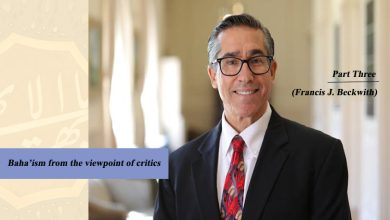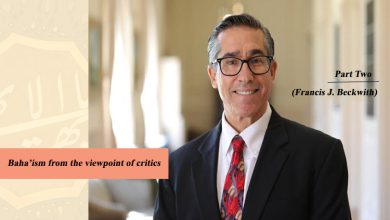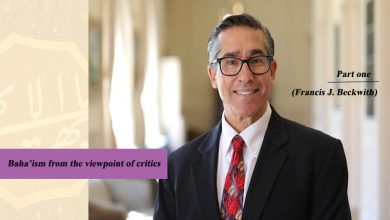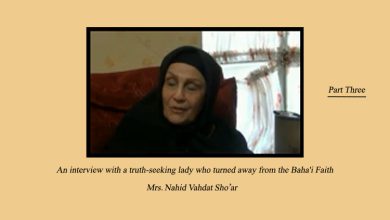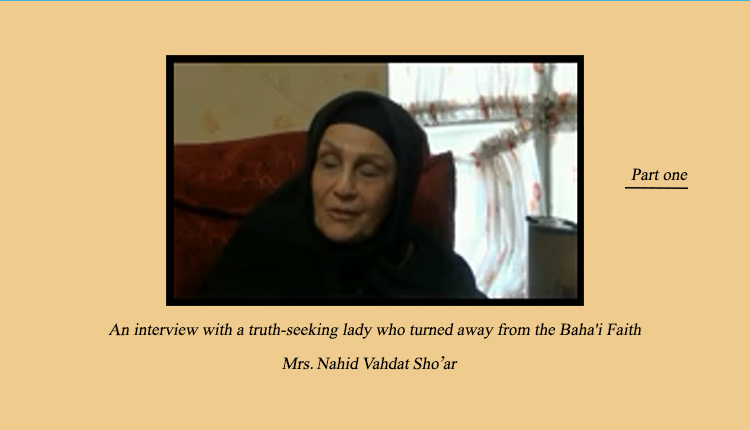
Mrs. Nahid Vahdat Sho’ar is a truth seeker who reached the truth through continuous research. Despite the deep differences, even the obvious contradiction, between what she had found and what she had seen and learned since childhood, she was willing to accept the truth with open arms.
Perhaps talking about such sentences and writing about such a great work is not so difficult, but the greatness of this work occurs when a person knows that if man wants to accept the truth, he must put aside his prejudice and the environment in which he has been grow up and what he has learned from his family and relatives; They don’t chant slogans, but they act, they tolerate the rejection of their family, relatives and friends, hear tongue-lashing and bad language from them and do not say anything, and in short, face a thousand different problems with courage; yes, according to Hafez, well-known Iranian poet:
As you step through the desert longing for the Ka’aba/ The thorns may reproach you, do not grieve
When Mrs. Nahid Vahdat Sho’ar found the truth, she accepted it and turned away from the Baha’i faith. Then, with firm determination and a lot of effort, in spite of the various limitations she had, she put all her strength in the pursuit of sincerity to introduce others to the true treasure she has found. In this way, she not only endured misbehavior and bad language from far and near, but also preferred to wake up others rather than being comfort and convenient. The following article is an interview with her, which we hope will be interesting for you, the dear reader:
Q: Thank you very much for giving us the opportunity to have this conversation. Mrs. Vahdat Sho’a, at a young age, you started to research from a completely Baha’i family where your father had a special position in the Baha’i organization, and became converted to Islam with knowledge. First, we ask you to introduce yourself and explain your family’s position in the Baha’i organization in your city.
A: Thanks a lot. In the Name of God, the Merciful, the Beneficent, I am Nahid Vahdat Sho’ar; my father was very active in the Baha’i organization of the city of Gonbad Kavoos. He was always a member of the Feast Committee. He was a moderator in all the feasts, and became members of the assembly almost for three periods, and he had many activities and was always busy with the organization. He got many books and his library was full of Amri books. He was very active and at the same time respected the rights of Allah, so that every year, they paid 19% of their income, which is known as the rights of Allah. Apart from all these, they collected money for the Baha’i organizations at the feats; because usually in the meetings, a box is placed in the middle of the table and those who participate in the meeting must put money in the box during reception. He was also very active there and apart from the rights of Allah, he always took money for the organization in his shop which he shared with his brother.
The organization collects money for various purposes; And nowhere did they give an answer as to where this money will be spent and what it will be spent on. Of course, they themselves apparently said that we spend this on people who are in poverty and have no money, but that was the appearance. They may have given a partial contribution, but they withdrew the main money and we understood that they used it for the expenses of the Amr or cause and missionaries who came from this country to that country, from this city to that city, that is, they spent the Baha’i propaganda, and so to speak, this money was mostly spent on the progress of the cause. This was our opinion.
Q: Mrs. Vahdat Sho’ar, What was the issue of lottery?
A: In addition, they also had a lottery program. Four or five days before the month of Baha’i fasting, which is in the month of Esfand, where they had a special feast every night for those four or five days, they would have dinner there and hold a lottery. sometimes, they also played music. I remember that in some cities they gathered there and at the beginning, after reciting prayers, they would give a piece of paper to everyone and say how much money you want to help the cause? Everyone should write the amount they wanted on that sheet. Their dinner was chelokabab or a food that they cooked themselves; or it was a sandwich and after dinner they would hold a lottery program. Many times I was surprised. A man went and stood up. Everyone had been sitting on the floor or on chairs. He said who would buy this carpet for so much. Someone said that I would buy two thousand tomans. Then another said, for example, three thousand tomans. The more … they competed with each other.
This means that they really supervised all the families in terms of money and who owns what? Do they have an heir or not? How is their financial situation? Even after the revolution, they sent people to our house. I was still at my mother and father’s house, which of course I had separated then, but I didn’t know the tragedy to that extent. I realized that the problem is much deeper. Even though they were in the organization themselves, two women came to visit every month. My mother was upset. He told my two sisters, who were staunch Baha’is, what are they coming for? I was wondering what they come for? Then we found out that they usually come and peep inside the houses, to find out what everyone has? Who does what? What is their financial situation? They did the same thing with our family.
Q: Mrs. Vahdat Sho’ar, you mentioned the issue of the rights of Allah. our audience may not be familiar with it. Please explain:
A: It is a religious tax in the Baha’i Faith that everyone has to pay nineteen percent of their income per year to the Baha’i organization, which they call the Rights of Allah. It is a simulation of the discussion of Khoms and Zakat in Islam. They wanted to do it and say that this is also a religion that has a kind of religious tax and all Baha’is are obliged to pay the rights of Allah. In addition, boxes were placed in the meetings and even passed around so that if someone had something extra, they could force people to pay property to the Baha’i organizations through other programs such as collecting donations.


